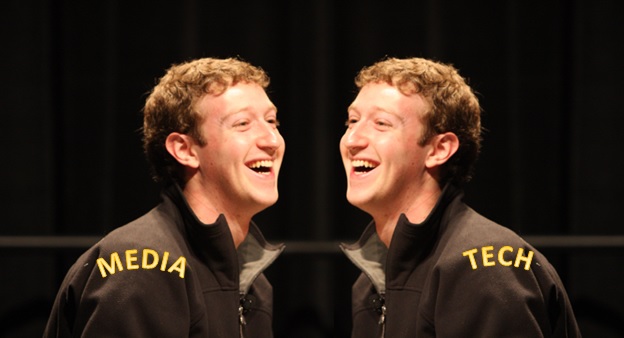
As times goes by, more and more mega-media brands find themselves in the uncomfortable process of attempting to determine exactly what business they’re in. What do I mean by that?
Well, traditional newspapers – at least the ones that are still left – have moved well beyond the print platform. In order to compete, they have websites, complete with video and social sharing. Most newspapers have apps – or even several of them. Many of their reporters are involved with podcasting.
And so it is with most media brands. It wasn’t that long ago when big institutions like CNN, The New York Times, and NPR were all uniquely different from one another. Today, their digital user experience can be very similar. While CNN may have a primary focus on TV, the Times is still locked on print, and NPR is anchored on the radio, all three are pursuing many of the same digital activities. You can look at their websites and see similar offerings and even layouts, from Facebook and Twitter pages to podcasts to videos to apps. While each brings a different spirit and their distinct values to the table, they are no longer doing what they were just doing a decade or so ago.
CNN isn’t just a cable news network, the Times isn’t just a newspaper, and NPR isn’t just a public radio network. They are all full-blown media companies, working hard to create content , new marketing opportunities, and audience building in spaces and places they couldn’t have imagined back in the ‘90s.
Even relative newcomers like social media channels are still very much ensconced in the process of defining and redefining themselves. Twitter is a case in point. It was once thought of as Facebook’s main pursuer. That’s a long, tough road, and Twitter learned it the hard way. A declining stock price and corporate shuffles are all part of Twitter’s struggles in recent years. They’ve also watched Instagram, Pinterest, and Snapchat make great gains.
That’s why Twitter CEO Jack Dorsey is now recasting the company again with a new pivot and a fresh spin that seems finally based on the way people use the platform. In a new interview with Harry McCracken in Fast Company, Dorsey explains it this way:
“We’re not a social network as people think about it. I do think we are a news network, and we’re a unique one, because we aggregate all the news media brands into one place, all of the individual voices into one place. And we allow anyone to comment on it in real time. And that’s fundamentally new, and something the world really hasn’t seen before.”
To Dorsey, the operative word behind Twitter is “live” because at its roots, it functions as a real-time news network. It’s interesting that “Sully” is now in theaters, because when news of that US Airways jet heroically landing in New York City’s Hudson River broke, it was first reported on Twitter by some of the passengers, rather than by the Associated Press or The New York Times. Yet, more than seven years later, Twitter is still grappling with its identity. But in some ways, that’s understandable, because when you’re in competition with a category killer like Facebook, it’s always challenging.
So you’d think Facebook would be comfortable in its 800 pound gorilla skin. But they’re also in the horns of their own definition dilemma. Last month Facebook founder, Mark Zuckerberg, was publicly wrestling with that same existential question: Who are we?
For most of Facebook’s time on this planet, Zuckerberg has viewed his social media platform as a tech enterprise. Facebook doesn’t create the content we scroll through every day in our newsfeeds – we do. So in that way, Facebook isn’t a media company. It simply provides the tech infrastructure that allows us to post, like, share, message, and do all the other things that content creators do.
As Zuckerberg explained it to a group of students in Rome last week:
“We are a tech company, not a media company…we build the tools, we do not produce any content.”
But as Matthew Ingram writes in Fortune, there’s a fine line between the two. The Facebook algorithm acts as a sort of tech gatekeeper, dictating the content we see, over and above stories, features and photos that are de-emphasized or simply invisible. In many ways, that’s what newspaper publishers and broadcasters have always done – determine the content we see and hear.
Ingram notes that Facebook’s obsession with video is a great example of editorial prioritizing. Zuckerberg may have a desire to get out from under journalistic responsibilities over issues like free speech and censorship, but control of distribution and the content its users are exposed to makes Facebook a media company.
You may have read the story about Facebook coming under fire for suppressing conservative political news in its Trending feature. As a result, Facebook eliminated human beings from that team, replacing them with engineers who oversee the algorithm. Overall, 15-18 members of the Trending section lost their jobs.
And yet, the lines are blurred.

This was put to the test last week when a Norwegian writer posted that Pulitzer Prize-winning iconic photo of a naked Vietnamese girl running away from a napalm attack. Facebook removed it because nudity violates the social network’s editorial standards, yet reposted it after a large community protested the move. Again, these are content decisions being made by a media company – not mechanical choices dictated by an algorithm and a bunch of code. There is no question that Facebook’s assertions will continue to be tested by active users who will push the boundary lines.
That brings us to radio stations – and the companies that own them. In the past five years, broadcasters have also had to come to terms with exactly what they are in 2016…and beyond. When companies like Scripps and Hubbard invest in podcasting, and Townsquare doubles down on events, the lines blur. Radio companies? Media companies? Event companies?
With seemingly every radio company now producing video, creating web publishing teams, going mobile, and partnering with alien entities like Shazam, the definitions become even murkier.
Are you working for a radio company or a media company?
Yes.
- How Will Radio Fare In The Battle For The Fourth Screen? - April 3, 2025
- Like A Pair Of Old Jeans - April 2, 2025
- What’s Fair Is Fair - April 1, 2025




What is Facebook? I think my wife summed it up quite well when she said that Facebook with its emphasis on “likes” and “friends” is like the high school hallway where all the jocks hung out and called out 1 through 9 ratings to all of the girls that passed through the throng.
Russell, perhaps your wife has figured this whole thing out. Thanks for commenting.
Facebook is only a tool for marketing products or promotions, for fledgling,businesses or startups. it really seems to have little other use than for people to sabotage their relationships with the rest of the world, including careers and family life.there are other rmediums in which to convey business , than facebook, and i have mo use for this medium. i have heard so many negatives about facebook that overwhelm the positives, i most likely wouldnt subscribe to it unless i was to promote radio, and broadcasting to draw audience response. facebook is a blight on the internet world and i would not grieve its demise in any way. thank you jacobs for this report. ITS very insightful. RGM
Appreciate the feedback, Brian. Thanks for reading our blog.